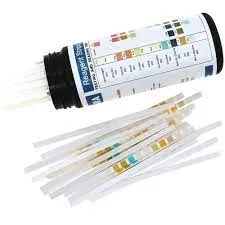Dec . 19, 2024 03:10 Back to list
Finding Suppliers for H Pylori Testing Kits and Services
Understanding the Importance of Buying Tests for H. Pylori A Guide for Suppliers
Helicobacter pylori (H. pylori) is a gram-negative bacterium that plays a significant role in the development of various gastrointestinal diseases, including gastritis, peptic ulcers, and even gastric cancer. With its prevalence affecting a substantial portion of the global population, the demand for effective testing solutions for H. pylori has increased dramatically in recent years. As suppliers in the medical industry, understanding the landscape of H. pylori testing and the essential role it plays in patient care is crucial.
The Need for H. Pylori Testing
H. pylori infection is often asymptomatic, making routine screenings vital for early detection. Patients may experience symptoms such as abdominal pain, bloating, nausea, and excessive burping, but these can often be mistaken for other gastrointestinal issues. Therefore, the significance of timely and accurate testing cannot be overstated. There are various methods available for testing H. pylori, including
1. Non-Invasive Tests - Urea Breath Test This test measures the presence of carbon dioxide in the breath after ingesting a urea solution. If H. pylori is present, the bacteria will break down the urea, releasing carbon dioxide. - Stool Antigen Test A sample of stool is analyzed for the presence of H. pylori antigens. This method is straightforward and effective for initial screening.
2. Invasive Tests - Endoscopic Biopsy During an endoscopy, a small sample of stomach tissue can be taken and tested for H. pylori. This method is more invasive but can provide additional information about the stomach lining.
It is essential for suppliers to understand these various methods and their applications, as they form the basis of the product offerings that can cater to healthcare providers’ needs.
Target Market for Suppliers
The potential market for H. pylori testing supplies is vast. Healthcare facilities, including hospitals, outpatient clinics, and gastroenterology institutes, are the primary consumers. Suppliers need to target these markets effectively by providing high-quality testing kits that are easy to use, reliable, and provide swift results.
Moreover, the growing awareness of gastrointestinal health awareness among the general public has led to increased demand for at-home testing solutions. Suppliers can capitalize on this trend by offering consumer-friendly testing kits that encourage proactive health management.
Product Selection Considerations
When selecting products for H
. pylori testing, suppliers should consider the following factorsbuy test for h pylori suppliers

1. Quality and Accuracy The accuracy of test results is paramount. Partnering with reputable manufacturers who comply with regulatory standards will ensure that the products meet the necessary health requirements.
2. Cost-Effectiveness Healthcare providers are often restricted by budgets. Offering competitively priced testing solutions can make it easier for suppliers to penetrate the market and increase sales.
3. Ease of Use Tests that require minimal training to administer or those specifically designed for home use can attract more consumers, facilitating easier distribution.
4. Support and Training Providing educational resources, training sessions, and customer support can enhance the suppliers' reputation and foster long-lasting relationships with clients.
Marketing Strategies
Effective marketing strategies are crucial for suppliers looking to promote H. pylori testing kits
- Educational Content Creating informative materials that outline the importance of H. pylori testing and the potential health consequences of untreated infections can help stakeholders understand why they should prioritize these tests.
- Digital Presence Building a robust online presence through social media, websites, and email marketing can reach a broader audience. Highlighting case studies, testimonials, and reviews can also bolster credibility.
- Partnerships Collaborating with healthcare providers, clinics, and hospitals can lead to recommendations and establish trust in the product.
Conclusion
The market for H. pylori testing is expansive, with the potential to contribute positively to patient outcomes and overall healthcare. As suppliers, understanding the types of tests available, the needs of healthcare providers, and the factors influencing product selection and marketing strategies is essential. By focusing on quality, cost-effectiveness, and user-friendly designs, suppliers can play a vital role in combating H. pylori-related health issues, ultimately leading to better health for patients worldwide.
-
Highly Accurate hCG Pregnancy Test Strips - 5 Min Results
NewsAug.02,2025
-
Premium Empty ABS Plastic Cassettes: Durable & Lightweight Storage
NewsAug.01,2025
-
Accurate Cocaine (Coc) Rapid Test Kit | Fast & Reliable Detection
NewsJul.31,2025
-
Accurate HCG Pregnancy Test Strips | Fast Home Use Kit
NewsJul.31,2025
-
Reliable Early Pregnancy Test Kit Supplier - Multi Plastic Cassette Options
NewsJul.30,2025
-
Transferrin Rapid Test Cassette – Reliable Tumor Marker Detection
NewsJul.29,2025

